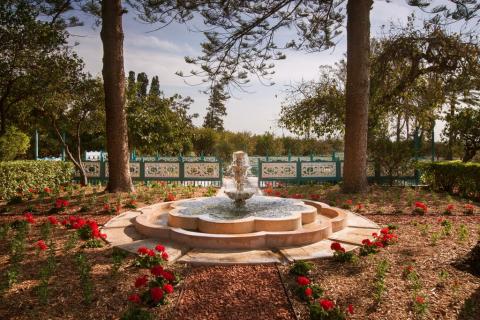A few days before ‘Abdu’l-Bahá's journey to Boston, the landlord of the Hudson Apartment House had complained about the excessive comings and goings of the visitors. The Master had therefore decided that large meetings would take place at the Kinney home. Now, back in New York, ‘Abdu’l-Bahá moved completely out of the apartment hotel, since the landlord felt that the comings and goings of so many diverse people, the additional work and difficulty put upon the staff, and the incessant inquiries to the hotel's management were more than they wished to cope with. ‘Abdu’l-Bahá didn't argue; He simply left. But, as usual, He showered them with His love as He departed, making them feel quite ashamed of their behavior. The staff begged Him to stay, but He did not, moving into the Kinney home at 789 West End St. for a few days until a house could be rented for him elsewhere.
Complaints
One day, when Lua Getsinger was in 'Akká she noticed a Western woman was telling ‘Abdu’l-Bahá all about her troubles. This was a strange thing to do for usually when people enter the presence of ‘Abdu’l-Bahá they are so filled with the outpouring of His radiant love that they think only of their blessings. ‘Abdu’l-Bahá with great kindness listened for half an hour to the western woman's troubles; they were really not very big troubles. At last he arose, and said he had another engagement and must be going. "But there," he said, pointing out of the window, "goes a man whom I will bring in to see you. His name is Mírzá Haydar-'Alí. We call him the 'Angel of Mount Carmel'. He walks on earth but he lives in heaven. He has had many troubles and he will tell you about them." ‘Abdu’l-Bahá went out, but quickly returned with Mírzá Haydar-'Alí whom he presented to the woman, and then departed.
The "Angel of Mount Carmel" with great humility and sweetness of manner began to talk with the woman of the luminous century in which we live and the divine age that is to be. She listened for a while, impatiently, and at last broke in with, "But ‘Abdu’l-Bahá said you would tell me about your troubles." Mírzá Haydar 'Alí looked up in amazement.
"Troubles?" he replied, "why madam, I never had any troubles, I don't know what troubles are."
(The Bahá’í Magazine
